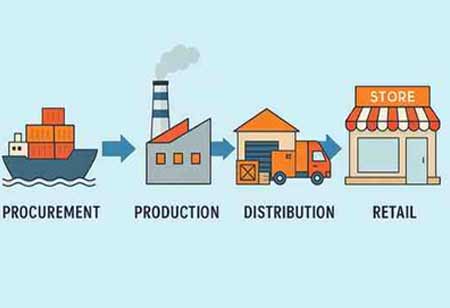Thank you for Subscribing to Healthcare Business Review Weekly Brief
Be first to read the latest tech news, Industry Leader's Insights, and CIO interviews of medium and large enterprises exclusively from Healthcare Business Review
The Ultimate Guide to Best Practices in Supply Chain Management
Healthcare supply chain management refers to the processes, teams, and transportation of medicines, medical instruments, and other materials used by healthcare professionals to perform their duties.

By
Healthcare Business Review | Thursday, May 01, 2025
Stay ahead of the industry with exclusive feature stories on the top companies, expert insights and the latest news delivered straight to your inbox. Subscribe today.
Effective supply chain management practices include inventory management, adopting cloud-based solutions, and centralizing and categorizing storage.
Fremont, CA: Healthcare supply chain management refers to the processes, teams, and transportation of medicines, medical instruments, and other materials used by healthcare professionals to perform their duties. Another purpose of supply chain management in the healthcare industry is to detect departmental flaws and offer preventative strategies.
It aims to identify weak areas in order to achieve targeted health outcomes and increase global health investment. When companies employ digital tools and technology to manage healthcare supply chains, they use actionable insights from multiple sources to continuously modify and enhance supply chain structures and operations.
Key Benefits of Supply Chain Management in Healthcare:
Among the most important advantages of supply chain management in the healthcare industry are lower operating costs, a competitive edge, greater transparency, and assistance with demand forecasting. Some of the most serious difficulties in healthcare logistics include keeping devices operational and clean, disposing of waste, storing and tracking inventories, and shipping. When faced with challenges such as insufficient storage space, rising labor costs, and traditional time-consuming approaches, it is the best alternative solution with solid logistics and supply chain management.
Digital supply chain management tools can help increase productivity and reduce time to market by encouraging better communication and collaboration throughout the healthcare supply chain. They contribute to the development of a healthcare value chain capable of directly responding to and recovering from the challenges of future pandemics and other public health disasters by increasing confidence and openness throughout the supply chain.
Navigating Challenges in Healthcare Supply Chain Management:
The difficulties of the healthcare supply chain are further complicated by factors such as product diversity, fluctuating demand patterns, stringent regulatory constraints, and the need for exact inventory control. Access to accurate and prompt data is essential for informed decision-making and optimizing inventory management.
Challenges in the healthcare supply chain frequently concentrate on inventory management, demand forecasting, cost control, and guaranteeing product quality and safety. Shortages, stockouts, and supply chain disruptions can substantially impact patient care, causing treatment delays or limitations.
Transforming Healthcare: Best Practices in Supply Chain Management
Inventory management, centralizing and categorizing storage, and using cloud-based solutions are examples of best practices in supply chain management. Businesses must guarantee that their materials department orders the appropriate amount of supplies to match the volume needed by their employees. There should be no additional material ordered based on a gut instinct, and all of this should occur without jeopardizing their patients' safety.
Cloud-based systems have various benefits, including lower capital and operating expenses. The technology operates independently of any hardware or IT infrastructure, allowing businesses to streamline supply chain processes while eliminating capital expenses. Furthermore, these solutions help to consolidate multiple systems, such as warehouse management and transportation cost management, which are crucial for supply chain operations.






